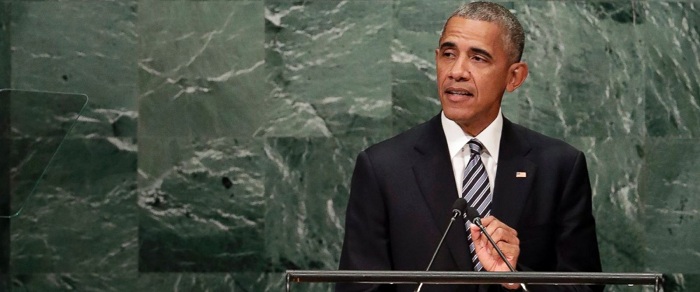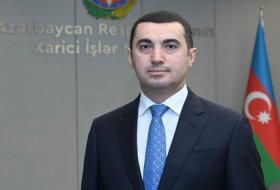Obama`s final UN assembly address: `At this moment we all face a choice`

“There appears to be a growing contest between authoritarianism and liberalism right now,” Obama said. “Given the difficulty in forging true democracy in the face of these pressures, it’s no surprise that some argue the future favours the strongman, a top-down model, rather than strong, democratic institutions.”
The UN summit this year is labouring under the shadow of resurgent east-west tensions and an apparently intractable conflict in Syria, where those divisions have proved a daunting obstacle to resolution.
In his own farewell address, the UN secretary-general Ban Ki-moon, who also has only a few months left in office, vented his anger at the international community’s failure to halt the Syrian conflict. He accused “powerful patrons” of warring parties on all sides in the five-year war of having “blood on their hands”.
“Present in this hall today are representatives of governments that have ignored, facilitated, funded, participated in or even planned and carried out atrocities inflicted by all sides of the Syria conflict against Syrian civilians,” the normally soft-spoken Korean secretary general said. “Many groups have killed innocent civilians, none more so than the government of Syria, which continues to barrel-bomb neighborhoods and systematically torture thousands of detainees.”
By contrast, Obama – normally the more passionate of the two statesmen – was dispassionate and more general in his remarks. He mentioned Russia only fleetingly, suggesting that in a post-imperial era, Moscow was “attempting to recover lost glory through force”.
He did not name his Russian counterpart and one of the world’s “strongmen”, Vladimir Putin, nor did he mention Donald Trump, the Republican presidential nominee who has spoken in favour of Putin’s style of leadership. But several of Obama’s allusions to domestic political divides were clear references to Trump and his electoral appeal.
He talked about “a crude populism – sometimes from the far left, but more often from the far right – which seeks to restore what they believe was a better, simpler age free of outside contamination”.
“We cannot dismiss these visions,” Obama said. “They are powerful. They reflect dissatisfaction among too many of our citizens.”
He made clear he was talking about both the strategic decisions faced by emerging powers and the looming, hard-fought presidential election at home, when he said: “I believe that at this moment we all face a choice.”
“We can choose to press forward with a better model of cooperation and integration. Or we can retreat into a world sharply divided, and ultimately in conflict, along age-old lines of nation and tribe and race and religion,” Obama said.
For his final appearance, Obama arrived late at the general assembly. When he was due on the assembly’s green marble podium, by tradition the second national leader to speak after Brazil, he was just getting into his limousine at a central New York hotel for the short journey across town. In a rare break with tradition, his slot was given to another leader, Chadian president Idriss Deby.
When his turn came, Obama recognised that it was his last time to address the general assembly and reviewed what he portrayed as the achievements in international diplomacy during his eight years in office: financial recovery in western markets, the denial of safe havens to terrorists and last year’s nuclear agreement with Iran.
“We opened relations with Cuba, helped Colombia end Latin America’s longest war, and we welcome a democratically elected leader of Myanmar to this assembly,” he said.
Despite the fact that world was more peaceful and prosperous than ever, “our societies are filled with uncertainty, and unease, and strife”.
He called it “the paradox that defines our world today”.
He explained much of the malaise by inequality, observing that a society in which 1% of the population hold as much wealth as the other 99% could never be stable.
Safeguarding free societies and markets, and the path to global integration “requires a course correction” that involved addressing inequality and the weakness of international institutions in the face of global threats. Failing to do so would lead down the path towards “strongman” leadership, who can never live up to the expectations they stir up.
Obama said: “History shows that strongmen are then left with two paths – permanent crackdown, which sparks strife at home, or scapegoating enemies abroad, which can lead to war.”















































